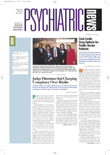A new study calls into question whether the herb Hypericum perforatum, popularly known as St. John’s wort, is effective in the treatment of depression. Researchers found no statistical difference between the herb and placebo on standardized rating scales used to assess patients with major depression.
“We can say with confidence that it calls into serious question the effectiveness in moderate to major depression,” said Richard Shelton, M.D., a professor of psychiatry at Vanderbilt University and lead researcher for the study. Shelton also told reporters that St. John’s wort shouldn’t even be recommended for treatment of mild depression without more rigorous research.
Shelton and his colleagues compared St. John’s wort with placebo in nearly 200 adult outpatients with a DSM-IV diagnosis of major depressive disorder, single or recurrent, without psychotic features. Patients were primarily rated using the Hamilton Rating Scale for Depression (17-item scale) (HAM-D) with secondary measures, including the Hamilton Rating Scale for Anxiety (HAM-A), the Global Assessment of Function Scale (GAF), and the Clinical Global Impression-Severity (CGI-S), and Improvement (CGI-I) scales. The results were published in the April 18 issue of the Journal of the American Medical Association.
The researchers found significant effects for time, but not for treatment or time by treatment on the HAM-D, HAM-A, CGI-S, and CGI-I. No significant effects were seen with the BDI or the GAF scores.
The study, according to the authors, presents “the first large, multicenter, randomized, placebo-controlled trial of St. John’s wort extract in participants with major depressive disorder conducted in the United States.”
In addition, the study is the first one with negative outcomes, in contrast to the more than 30 previous reports that noted positive effects of the herb.
The authors noted that their results did not support any significant antidepressant or antianxiety effects for St. John’s wort; however, the herb was well tolerated. Headache was the only reported adverse effect that occurred significantly more often with St. John’s wort than placebo.
Shelton acknowledged that the study was limited because it did not compare St. John’s wort with any active antidepressant drug; however, such a study is currently under way through the National Institute of Mental Health.
“There was some evidence in the report that larger samples could have resulted in statistically significant differences between the St. John’s wort and the placebo groups showing efficacy for the former,” Darrel Regier, M.D., M.P.H., director of APA’s Division of Research and executive director of the American Psychiatric Institute for Research and Education, told Psychiatric News. “It should also be emphasized that the current lack of clinical efficacy is for major depression and not any clinical depression, such as dysthymia or minor depression.”
Regier also noted that one aspect not addressed in the current study were the potential interactions between St. John’s wort and other medications when patients self-medicate.
“Until the results of the NIMH study are in,” Regier observed, “this one serves as a warning that previous unambiguous endorsements of the efficacy of St. John’s wort should not be accepted.”
Shelton and his coauthors called for “more methodologically rigorous studies of depression” as well as primary anxiety disorders and cautioned that any claim of effectiveness should not be made until there are strong supporting data from well-controlled clinical trials.
An abstract of the study, “Effectiveness of St. John’s Wort in Major Depression: A Randomized Controlled Trial,” is posted on the Web at jama.ama-assn.org/issues/v285n15/abs/joc02013.html. ▪
